New World Review
A hollow land
Western developers have shied away from Massively Multiplayer Games for a long time. Ever since World of Warcraft became (and arguably remains) on top of the genre, few have attempted to dethrone it, and most projects nowadays come from Asian developers. Creating an MMORPG requires a ton of resources, constant upkeep, and managing millions of players' expectations. To make an MMO as your debut project seems inconceivable – but perhaps it's not so bad when you're backed by one of the largest companies in the world. Such is the case for New World, a recently released MMO from Amazon Game Studios. It's a functional, occasionally entertaining, and a mostly by-the-numbers effort but one that is severely lacking in variety and often feels like a lifeless grind.
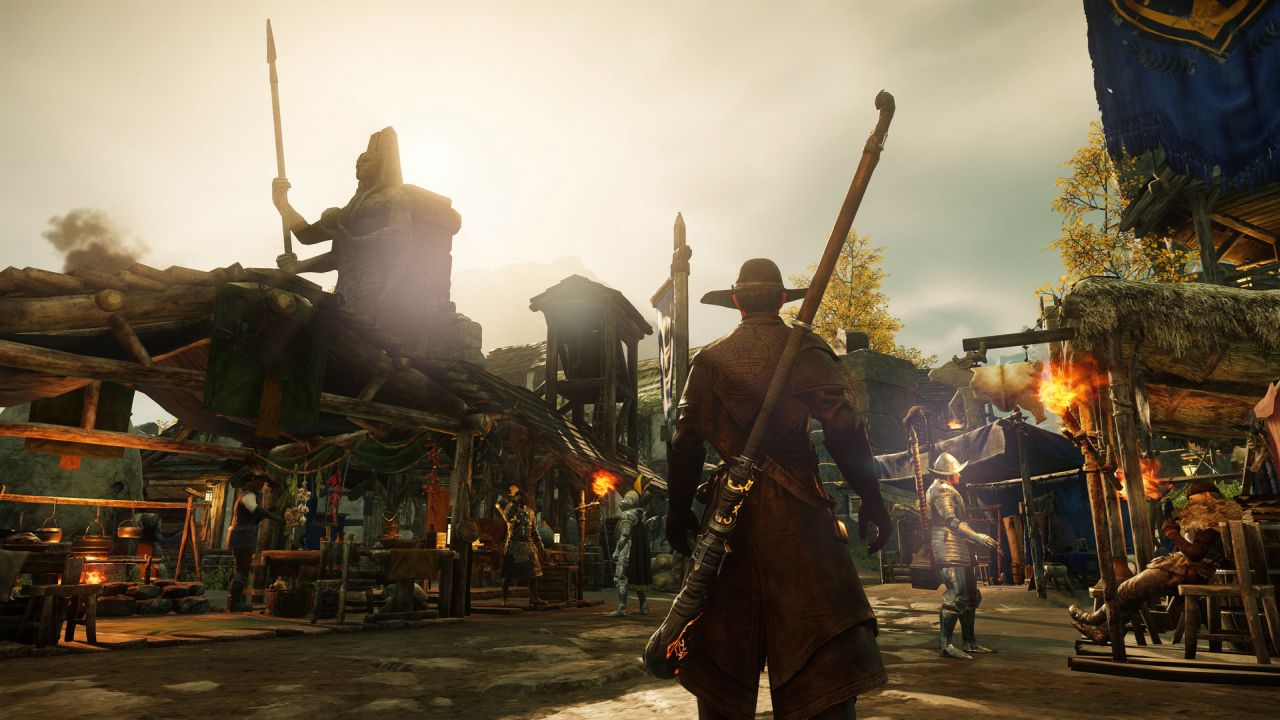
As any MMO may expect, the launch was met with some server problems. Severs were capped at 2k people (whether that's a good idea now or in the future, remains to be seen), creating hour-long queues. When you actually got in, there were no issues. After about a week since launch, the developers made changes to how and where players were able to create new characters, and since then the problem with queues was entirely eliminated on all but the busiest of servers.
There's not much of a story to get invested into. Players take on the roles of explorers in the 1600s who hear about an expedition in the Atlantic Ocean that has gone missing. Eager for adventure, they follow suit and find themselves crashing onto the shores of Aeternum Island. This land promises many adventures and riches, and previous explorers have already setup a few outposts here. But there's also a curse that has turned many creatures and other inhabitants hostile, brought the dead back to life, and so on.
The overarching goal is to make your new life on the island, while helping some of the locals and perhaps finding out the source of the curse. It's a very thin main narrative, and one that is delivered at a dreadful pace of a single quest every 3-5 levels. If you're expecting any cutscenes or a worthwhile story to draw you in like in Guild Wars or Elder Scrolls Online, you will be rather disappointed. It's too bad, because the 16th century setting with shades of magic seems promising, and the pirate themes of the game feel original. But, after a promising introduction and perhaps the first 10 levels, the narrative largely fades into the background. There is a decent amount of voiced NPCs and collectible notes to find, but you'll never really be interested in what they have to say or their reasons for sending you on a quest.
New World doesn’t try to reinvent the wheel when it comes to the overall gameplay design philosophy of an MMO. Players start their journey washed up on the beach, where they are greeted by an NPC who gives them a few of the basic starter quests – go gather something, kill a few wild animals, craft some basic food, equip your starting weapons and armor as rewards, and so on. From there you progress to the nearby settlement, which serves as the typical place for players to gather, craft, pickup new quests, and manage their item storage. It's standard fanfare; neither particularly engaging or original.
You don't have to pick a character class in New World, but rather just customize your name and initial appearance. As you play and earn experience, you will get attribute points to spend on each level up, which include typical choices of strength, dexterity, intelligence, and so on; each attribute aligns to boost your damage with one of the game's weapons. Spending attribute points on Strength will boost your sword and hatchet damage; putting points in Dexterity will improve bow and musket, and so on. The approach is fairly flexible when it comes to what role you wish to fulfill.
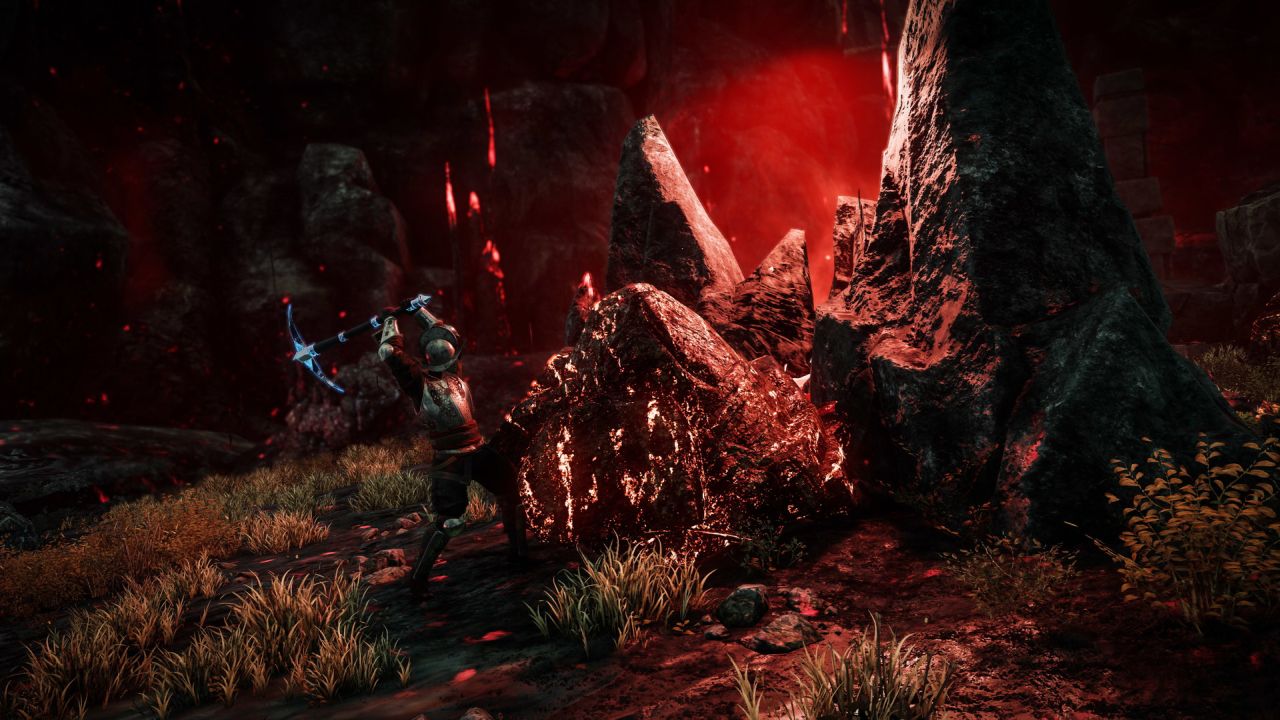
Any weapon you wield improves your proficiency with it. Each weapon has two separate skill trees to put points into and unlock new passive bonuses. You can wield two weapons at a time and swap between them during combat. The melee options include Axe, Hammer, sword/shield, rapier, hatchet, and spear; the ranged weapons are a bow and a musket, which do require ammo to be purchased/crafted. The musket is a hitscan weapon so you don’t need to account for bullet drop, but the arrows do have an arc. Lastly, the magic options are a Fire staff, Life staff, and Ice Gauntlet – these also shoot physical projectiles so you need to account for distance and lead your targets.
In combat, New World plays like a fairly basic action game – all weapons have a regular attack, a strong attack (by holding LMB), and an ability to block with RMB. The melee weapons feel decently satisfying to use and there is some weight to them, and the action flows well without any hitches, despite it being an MMO. The same goes for ranged and magic weapons, which sometimes have a close-range option such as the fire staff that can turn into a flamethrower type. The action unfolds decently well, as you hack away at your targets, and utilize skills on a cooldown. There are a few skills that can be unlocked for each weapon, and you can only equip three at a time, so this isn't a skillbar heavy game whatsoever. The skills are typically all independent of each other, so there are no combos to worry about.
However, all this perceived flexibility is for naught, with the main reason being it takes ages to get your weapon proficiency up. It took well over 50 hours of gameplay to get one weapon to its max proficiency, and that's after switching to it exclusively and largely foregoing the use of the secondary one. It would take a large amount of time to get another weapon (or more than one) to max level, so that you can freely swap between them in the end-game and not feel underpowered. So while you're not locked into a class or a weapon, the truth is that it would take ages to get them all leveled up, so you should pick a favorite early and stick with it.
Gear also has a role to play – with typical light/medium/heavy options, which allow you to dodge/roll, dodge, or simply sidestep in combat, respectively. You can mix/match the individual armor pieces, and they come in a few different rarities which add passive bonuses to their stats. Weapons have similar rarity characteristics, and passive bonuses. The one important disappointment with the system is that there is no refining or leveling up of equipment - even if you like a skin or a stat roll. Once you have something better, your old stuff has no value. A vast majority of items are bound to you on equip or on pickup; you can salvage it, but all you get are a few coins and a repair part. The repair parts are a simple currency used to fix gear when it loses durability – a rather simple and throwaway mechanic, as you will have more repair parts than you know what to do with.
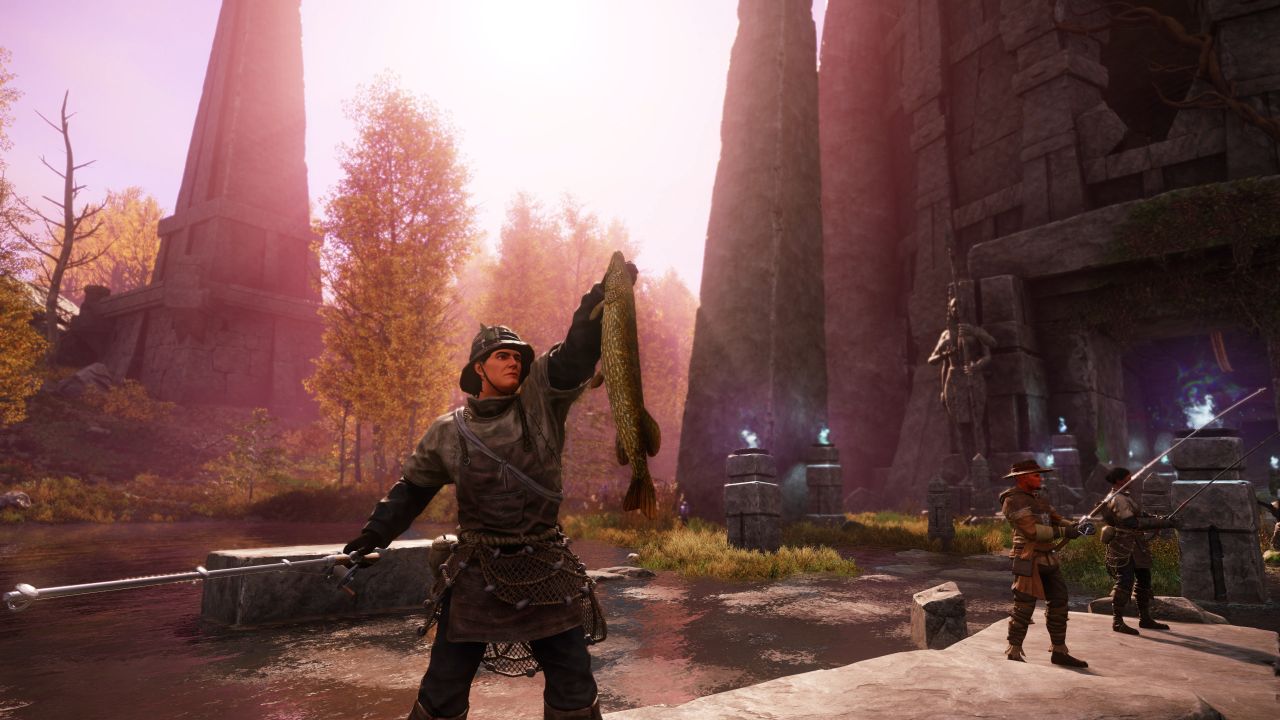
The enemies that you will face range from animals such as boars and lynxes, to the actively hostile skeletons, undead pirates, ghosts, and a few other types. Most enemies are either primarily ranged or melee, though many have both attacks. They have similar attack patterns, and will chase you for a while before giving up if you go too far. Blocking their attacks is easy, but does take stamina. As long as you don't get surrounded, and fight enemies within your level range, the game is not particularly difficult. For harder content, you'll want to team up with others and have the group include a healer with a Life staff. While you can chow down on food and drink potions, healers are the key difference makers. So while the game doesn’t lock you into a class at the start, it still ends up being a typical setup of DPS and Healer roles.
The map is of decently large size. There are no mounts here, so you'll be hoofing it between towns, which can take around five to ten minutes of straight running. A fast travel mechanic does exist, but it costs a currency called Azoth, which is only earned via quests and random drops. There's also a limit to how much you can own; at the outset, you'll quickly fill up the limit and start seeing the rest go to waste. But later in the game, when you've got the whole map to travel across, you may find yourself quickly spending it. Players can also be checked into a hotel at a town (just one at a time) which allows free fast travel back to it once every hour. Or you can buy a house later on, which also becomes a free fast travel destination once every few hours, in addition to offering extra storage and ability to decorate it (but you'll have to pay hefty weekly taxes). The currency is also used in crafting, so you'll want to be careful with your Azoth spending.
New World runs the gamut of being streamlined, stock-standard, and unexpectedly cumbersome in its gameplay. So for example, you can auto-run, and if you stay on the road (which may not be the most direct path), you will avoid aggroing any foes. There are quest markers that show you exactly where to go for any and all tasks, so you will never be lost. However, while running – or mining/gathering – you cannot open your inventory, as that causes the character to stop. So you are forced to sit and watch your hero trot along, unable to multitask. You can have a gander at the big overhead map to ensure your heading is correct, as the game shockingly lacks a minimap. Instead you get a compass at the top of the screen which can show objective marker direction, but that's hardly as useful, and it lacks any relevant information when in towns.
Similarly, New World is quite accessible - from quest markers, to the combat, and most of its clean UI – but it's also a game that lacks discovery and exploration. The whole map is visible from the start, including all towns (no fog of war); there is no experimentation or discovery with crafting – all recipes are either immediately available, or need to be found/purchased; you can't just play around and mix ingredients. There is no sense of adventure or discovery here.
The UI quality also varies. It clearly and helpfully shows which attribute affects which weapon, and you can always drop and re-spec your attributes for a price. When shopping at the market in town, or crafting, the interface is fairly simple and straightforward. However, when selling, it’s cumbersome, with no search ability or clear indication of your sales progress. The chat interface is also a mixed bag – the filtering and text size options are nice, but the display has too much wasted space.
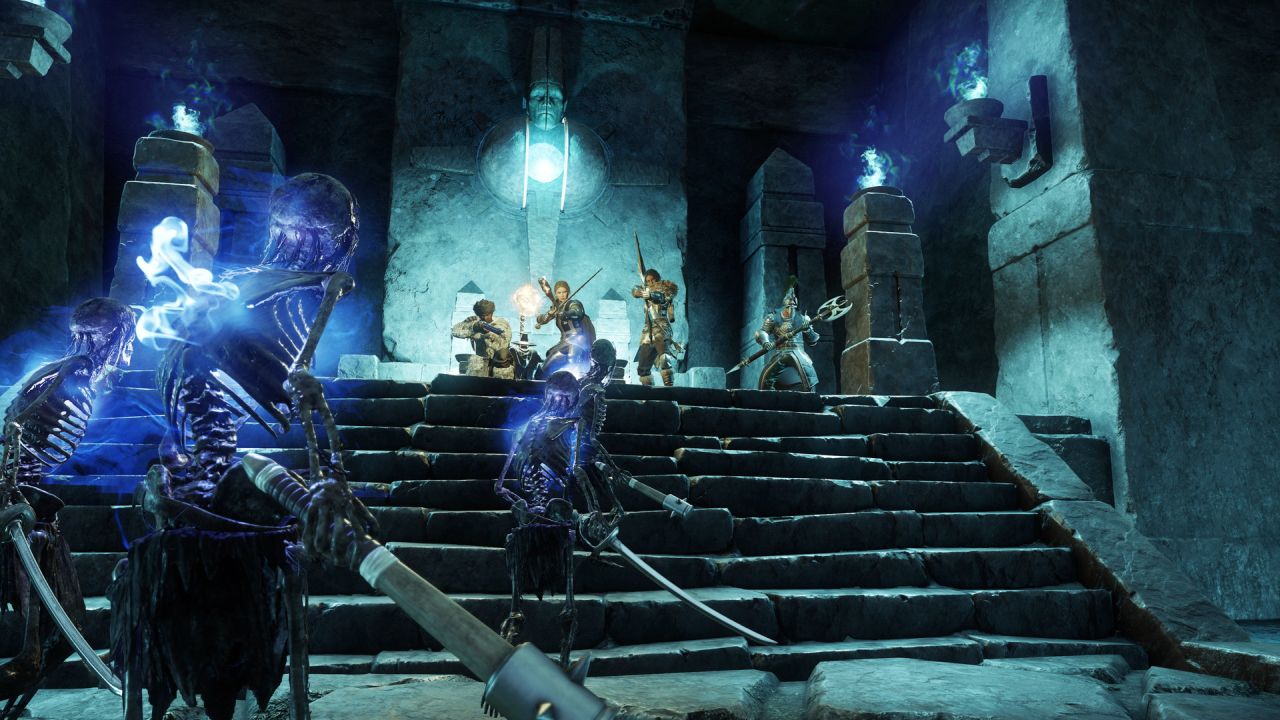
As you run around between outposts and complete quests, soon begins to emerge the biggest issue with New World – the mind numbingly repetitive nature of all its content. Yes, many of the NPCs are voiced, but it matters little when they all ask you to do the same things over and over. There is one central story quest that will take you all across the map and into the end-game high-level zones. But this quest offers the thinnest of narrative details, and its steps grow exponentially in required level. For the vast majority of your time, you will be running quests from the towns, and they all fall into two categories – kill a certain number of specific enemies in a specific area, or gather something from enemies/chests in a specific area. That is it. That’s the entirety of what you will be doing – whether that’s quests from characters in town, or the randomly generated quests from your faction leaders, or the town's job board. All quests feel meaningless, interchangeable, and incredibly dull. They will ask you to return to the same locations over and over, under different pretenses – kill this type of enemy, gather some special item (that only drops when you have the quest active) and so on.
PvE feels monotonous, pointless, and copy pasted. A great example being a quest that asks you to visit three tower structures and kill a certain amount of enemies at each. Each tower doesn't have enough enemies to fulfill the quota, so you kill a few, and wait for them to respawn again. Hoping, of course, that no other players are around, as if you don’t do enough damage to the enemy, it may not count. This particular MMO trope extends to bosses too, as you will probably come across groups waiting for a boss to respawn - only some people who did the most damage get the credit. You then run to the next two towers, do the same, and run back to town to turn in the quest. Lo and behold – now you have a new quest to do the same thing, at the next three towers. Indeed, there are around 15 towers, and you do three at a time. It's ghastly.
To try and dilute your time of just running to quest markers, you may stop and mine some materials. Players can fish, log wood, mine minerals, gather herbs, and hunt/skin animals as the five primary resource types. As you chop down trees, hack away at rocks and gather fruit, your skill in each will increase, albeit slowly. After a while, reaching high enough levels lets you gather more rare materials that are otherwise inaccessible. You can craft or purchase better gathering tools, which can boost how quickly and how much you gather from a node. It's all fairly typical MMO stuff.
One thing you do have to worry about is the weight. Unlike most MMO's out there, New World has a limitation on how much you can carry, and keep in your town storage. Some may argue it adds another layer of strategy, but others may consider it yet another way that the game prevents players from being efficient with their time. If you carry too much, you will be slowed to a near crawl, and thus need to drop something and run back to town – again. In the later game stages, you can equip some additional bags to increase your capacity, but your town storage will likely be getting full, and you will have to put your items in another town. Just like the weapon and gear degradation system, not everyone will be a fan of the weight; these mechanics feel more appropriate in single player RPGs.
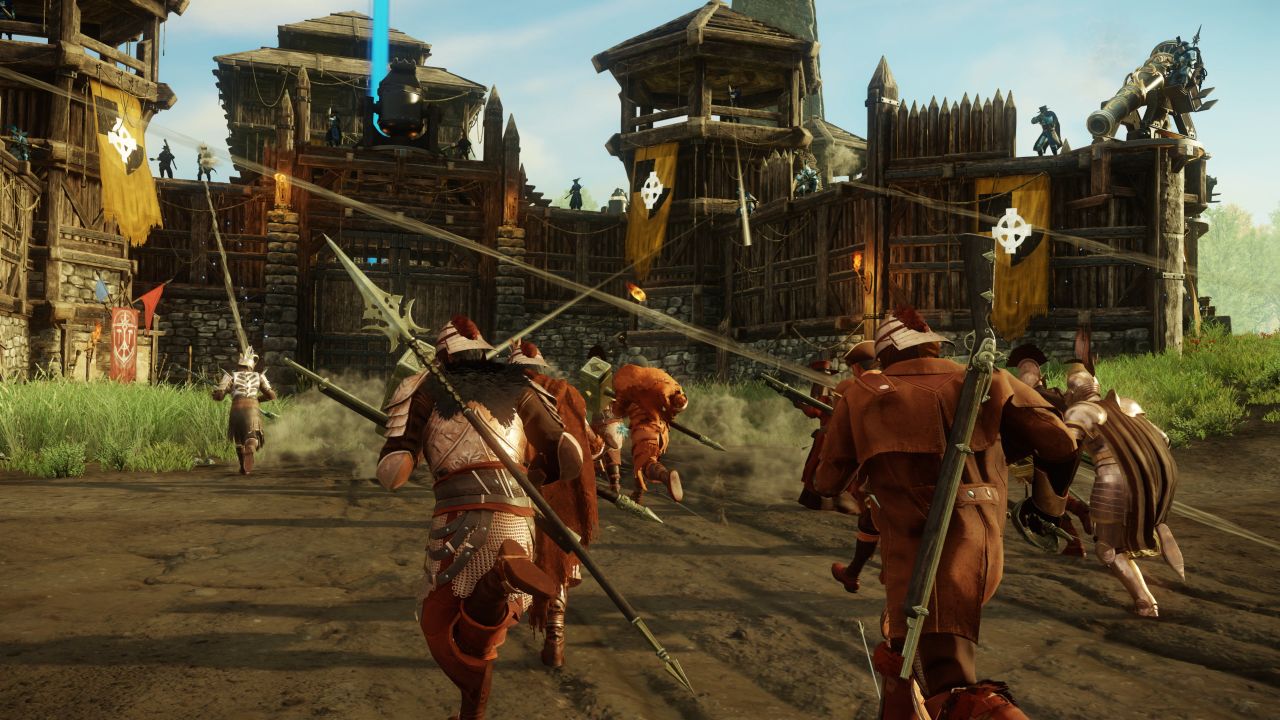
Also typical is the crafting. There are crafting stations in towns where you will use resources to refine them into something new or create weapons and armor. Your crafting skills fall into an even bigger category range, from weaponsmithing to iron working and cooking. Here again, you will spend a lot of time mindlessly crafting the same basic ingredients over and over to level up the relevant skill. Eventually you will unlock new recipes and items, but just like resource gathering, it takes a significant amount of time to get anywhere with crafting, as you churn through millions of basic resources, refining them over and over and getting less and less experience. At least there is a convenience that crafting will use materials that you have on you and in the local storage automatically.
But even with distracting yourself by crafting and gathering, you will continue to yearn for some new gameplay experiences that don't involve running someplace you've already been and killing mobs. In a way, New World must be aware of how little content it has, so it gatekeeps it away from players for very long stretches of time. The first new things you unlock are Expeditions (instanced dungeons for up to five players). These short, linear action bouts feature small areas and the occasional simple puzzle or some backtracking, and maybe an optional room or two. It's the kind of content you'd expect from a B-tier single player RPG released ten years ago. There are only a handful of dungeons, with one being unlocked at levels 25, 35, 45, and so on. But even here, the design decisions are baffling. First, someone in your group must have an orb in order to enter – heaven forbid players can replay something they enjoy. The other design mishap is that dungeons only drop gear at their level. So you might get a sweet weapon in a level 25 dungeon – but it will become obsolete in a few hours, and the dungeons also do not scale, so there is zero reason to revisit them.
So you return to the open world, running around doing pointless quests just to level up. The level grind is real in New World, no matter how efficient you try to be. You pick up all the quests you can in a town, you plan your route, and you even spam the town job board quests which are unbalanced and can give you as much XP for handing in a few buckets of water as 20 minutes of running for a quest does. But it still takes ages until you lock something new to do, like the next dungeon. Another alternative is random portals to the underworld that appear on the map, and players must destroy a few waves of enemies and close the portal for some experience and a loot chest. These portals are an example of the meta-game.
New World features a few different meta mechanics that involve Companies (guilds) controlling towns. There are three factions that players will be asked to join. There are no real differences between them, it's akin to picking a team. Guilds must also belong to a faction, and with enough money and influence they can take control of the game's towns. When under a guild and faction control, the owners can taxes for players who choose to trade/craft/buy a home in that town. The mechanic is interesting, and it caused almost a civil war on our server chat because the busiest central town in the game was charging the highest possible taxes. As a player, this also means a few things – fast travel between towns owned by the same faction is cheaper, and you can also transfer your storage inventory between towns only if they are under the same faction control (not necessarily the same guild). Guilds also pay to upgrade the crafting stations in town, letting you craft higher tier items. Guilds must pay upkeep costs in order to maintain the upgrades. To help your faction maintain control of a town, and pay its upkeep, you can do the random quests from the town board, and watch as the guild (hopefully) uses all that income to upgrade the area's Fort or provide passive bonuses to players in the area.
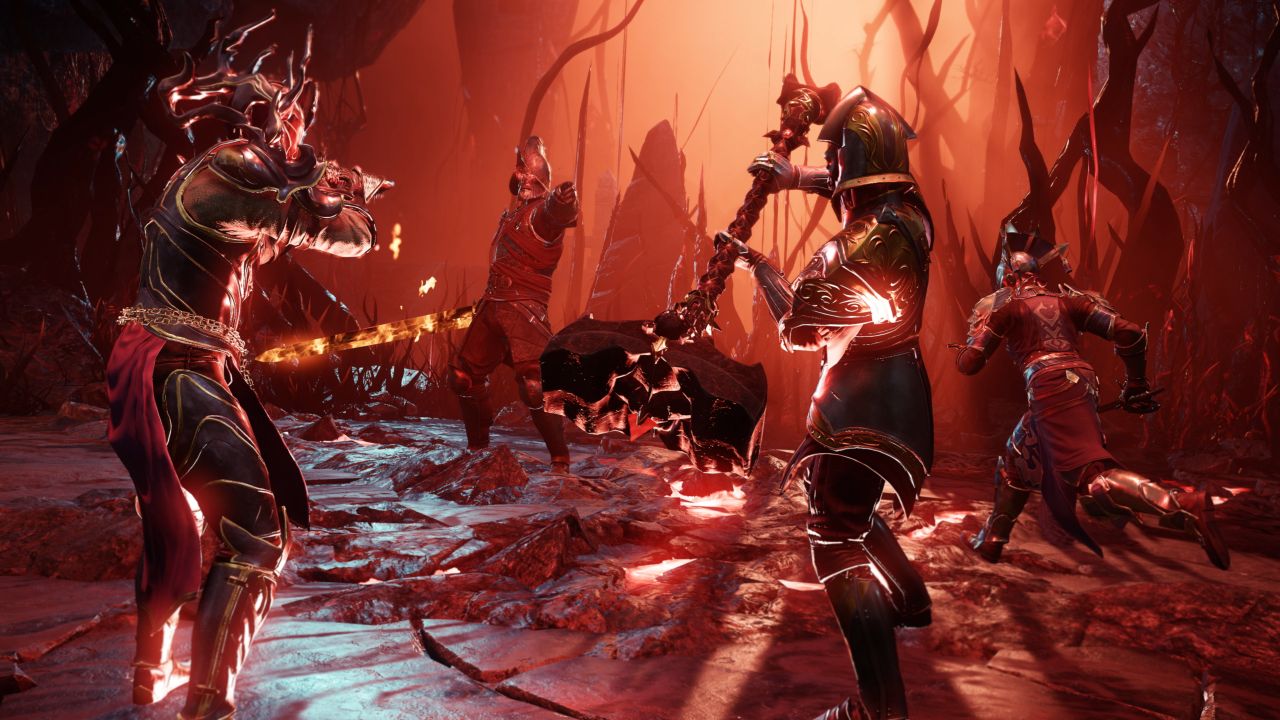
The Forts are a separate structure that govern how prepared the area is for PvP and Invasions. When other factions declare an attack, the PvP battles take place at the forts and are called Wars. The Wars are auto-scheduled a few days ahead of time, and players can sign up to fight for their faction as attackers or defenders. But whereas New World gatekeeps players from its content by level, in War it's other players that will do that. It makes sense – you only want the highest level people to participate in a PvP event, because again there is no scaling for some reason; you could easily host Wars for players within specific tiers, but alas. So you probably won't be picked to fight in any Wars until you're close to the 60 level cap, or you weasel your way into the top guilds on your server and ask them nicely.
Once you do get to go (perhaps by finding a War in the higher level zones, where the player population is much more scarce), you'll find that it's a fairly basic event. The Fort, with all the upgrades that the controlling guild has managed to buy, is hosted by the defenders, while attackers start out in a camp nearby. The two teams then fight for control of three objective markers, and eventually fight inside the Fort if the attackers make it that far. War is a 50vs50 event, so some level of coordination is required, but on the individual level it becomes a hack and slash mess at the control points. All players are a physical model so you can be swinging away at air if your opponent is behind a teammate. You could have some entertaining battles in isolation, but the central choke points are just a spam of special abilities and players swinging, while the ranged casters stay back. Players can also utilize the Fort upgrades, such as turrets, to rain death from afar on the attackers.
Nothing really changes in PvP as far as gameplay mechanics go. You can run around and explore the world with the PvP set to "on" which means any member of the other two factions can attack you on sight, but death doesn't mean much in New World, whether in PvP or PvE. You simply get to respawn at the nearest town, or a camp if you construct one nearby. Players can use any camps, even those built by others as long as you stop to activate it, which is convenient. After winning or losing a War, which have a 30 minute time limit, you get a chunk of experience and an item or two, and the controlling guild/faction changes if the attackers won.
There are two more unique activities in New World, but again the game gatekeeps them until the bitter end. An Invasion is a meta event that occurs if players don’t clear enough of the above-mentioned portals that appear on the map, which means the monsters mount an attack on the Fort, again at a pre-set time so players can sign up to defend. Invasions are essentially a PvE version of War, as you try to hold off the invading hoards before the time limit runs out. There's no reason this mode couldn't be scaled down so more players could try it earlier, but instead it's locked until level 50. Another event, this one locked until the final level 60, is Outpost Rush. This is a PvP event where players again compete for control of points, but this time in a random map with no Forts involved. Once again, the game's pointless gatekeeping and lack of scaling only works against the experience.
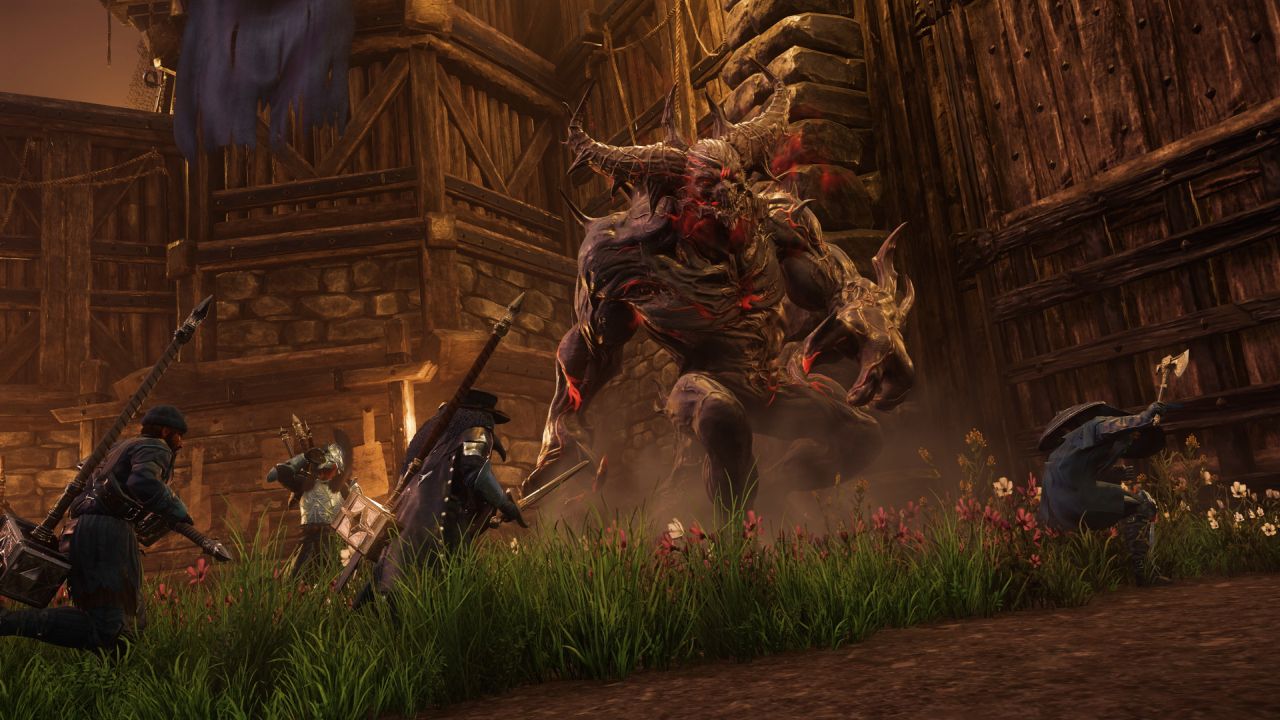
The health of PvP and meta-game mechanics depend heavily on the player population. Another important aspect is the trade post, where you can buy and sell things from other players. Here again the game makes an interesting decision to make the market local to its town. While you can check prices elsewhere, like your storage, you can't buy or sell unless you’re physically there. This creates a problem with the late-game areas having pretty much nothing for sale, or at increasingly insane asking prices for the mere basics. How all these meta-mechanics and trading outposts will play out in the long run remains to be seen, but the troubling signs are already there, especially if you aren’t on a busy server. Over the past 4 weeks since launch, the active daily player population seems to have fallen about 50% according to Steam database, so server mergers are possible in the future.
If there's one more area where New World succeeds, it's the presentation. Although we have to prepend the praise with "for an MMO", this is indeed a very nice looking game with a decent art style. The game runs at a steady framerate, has a variety of options to tweak the visual quality, has a very good draw distance, and some excellent lighting effects. From the dark graveyards in a forest, to the sunny beaches, to the snowy mountain areas, and the fog that rolls in over the valley, the visuals can be surprisingly good at creating an atmosphere; the day and night cycle also adds to this. The sound design can also be surprisingly excellent, with the crack of a pick hitting the rock echoing around you, to the falling trees after you've cut them down, to how your character sounds muffled when using a face-covering helmet, the nuances are pretty impressive.
This review of New World is based on over 80 hours play, reaching level 50, and trying everything (except Outpost Rush) that the game has to offer. We visited every area, got each gathering and crafting tier to at least level 50, and won some Wars. But there's only so much grinding the same lifeless quests over and over that someone can handle, and perhaps the recent sharp drop in player population is an indicator of that. New World is pretty, and if you're just wanting a game to mindlessly run around in while listening to a podcast or something, it may fit the bill. But players hoping for a narrative-driven, engaging experience, with some good content, should look elsewhere.
 Comments
Comments















